The low cable row is an upper body exercise that primarily targets the middle and upper back muscles, including the latissimus dorsi, rhomboids, trapezius, and rear deltoids. Additionally, it works on the arms, core, and shoulders.
It is done using a cable machine with an adjustable pulley that is set at a lower position.
This low cable row can be performed in various ways to target back muscles from different angles.
- Using different grip positions (overhand, underhand, and Neutral grip)
- Using different attachments (a rope, v-handle, straight-bar, and single-handle.)
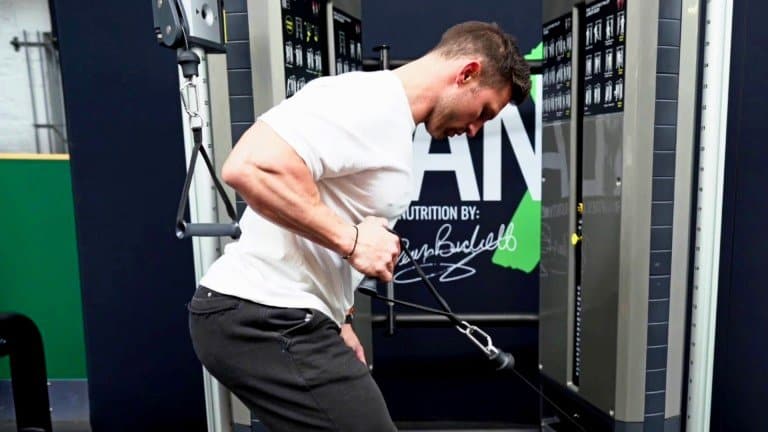
- Muscles Worked During Low Cable Row
- How To Do Standing Low Cable Row
- Variations And Modification Of Low Cable Row
- Make It Easier
- Make It Harder
- 1. Single Arm Standing Low Cable Row
- How To Do One Arm Standing Low Cable Row
- 2. Wide Grip Seated Low Row
- How To Do Wide Grip Seated Low Row
- 4. Standing Low Cable Rope Row
- How To Do Low Cable Row With Rope
- Best Alternatives Of Low Cable Row
Muscles Worked During Low Cable Row
The cable low row is a compound exercise, which means it works many muscles simultaneously.
- The main muscles worked during the low row are: Latissimus dorsi, Rhomboids, Scapula, Rear deltoid and Trapezius muscle groups.
- Secondary muscles worked during the rows: Biceps, brachialis, Brachioradialis, Core muscles, and Infraspinatus.
- Antagonist Muscles worked: Chest, triceps, front deltoid.
The muscle groups in the legs as either accessory dynamic movement stabilizers or as simple static support stabilizers.
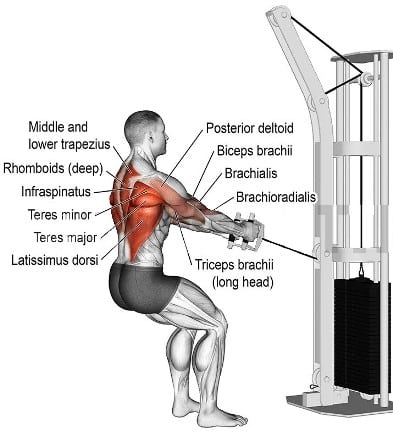
How To Do Standing Low Cable Row
Standing low cable rows are often used in upper-body workouts because they are a great way to work the middle back, biceps, lats, and shoulders. This exercise also strengthens your lower back and core.
The low cable row can be performed in different grip positions and attachments.
- Underhand grip
- Long bar… Get creative!
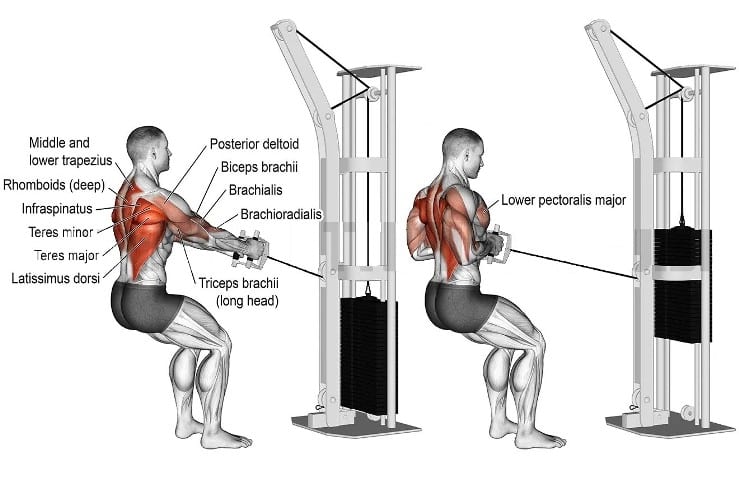
- Grab the V-hand with both hands, take a few steps back, and let your arms extended.
- Bend your knees and waist to keep yourself upright.
- Pull the handle towards your midsection and squeeze your shoulder blades together as you do so.
- Then, slowly release the handle back to the starting position.
- Do 3–4 sets of 10–12 repetitions, with a rest period of 30–60 seconds between sets.
- Try to avoid rounding your shoulders or arching your back during the exercise.
Know More: 18 Best Cable Back Workout And Exercises For Wider Back
Variations And Modification Of Low Cable Row
Depending on your choice and requirements, there are many variations of low cable row exercises that you can include in your back workout routine.
Make It Easier
If you are new to the low cable row, you can apply a few modifications to make it easier.
- Start with lightweight and low reps.
- Increase the weight and reps once you can do the exercise perfectly.
Make It Harder
When you’ve mastered the form and can complete the exercise, it’s time to challenge yourself with variations.
Try these modifications if you want to work back muscle fibers from different angles or if your low rows are too easy.
- You can pull the cable with one arm at a time, or with one arm along the side of your body.
- At the end of the pulling phase, pause for 3 to 5 seconds to challenge your muscles.
1. Single Arm Standing Low Cable Row
The low cable attachment and the pulling angle of the exercise allow for a more direct and focused contraction of the latissimus dorsi, which is the largest muscle in the back.
It allows for a greater range of motion than other single-arm row variations.
The low cable row also prevents excessive spine twisting or bending, which can occur in other variations of single-arm rows.
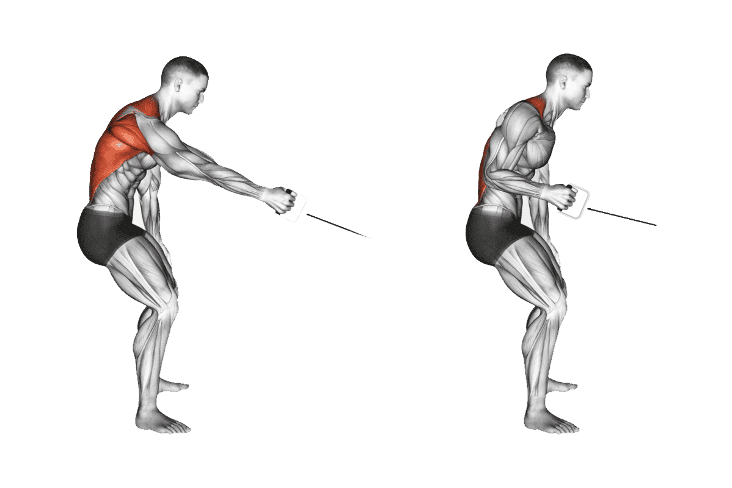
How To Do One Arm Standing Low Cable Row
- Grab the handle with one hand and take a step back.
- Your feet are shoulder-width apart, and your knees are slightly bent.
- Pull the handle towards your body by retracting your shoulder blade.
- Focus on squeezing your shoulder blades together as you pull the handle towards your body.
- Pause momentarily, then slowly lower the handle back to its starting position.
- Repeat the exercise for the desired number of reps, switch sides, and repeat with the other arm.
2. Wide Grip Seated Low Row
Wide grip low rows can make your back thicker because the muscles in your upper back do most of the work.
To do it correctly, be sure the movement is slow and fluid – no jerking or raising yourself up to push down with your body weight.
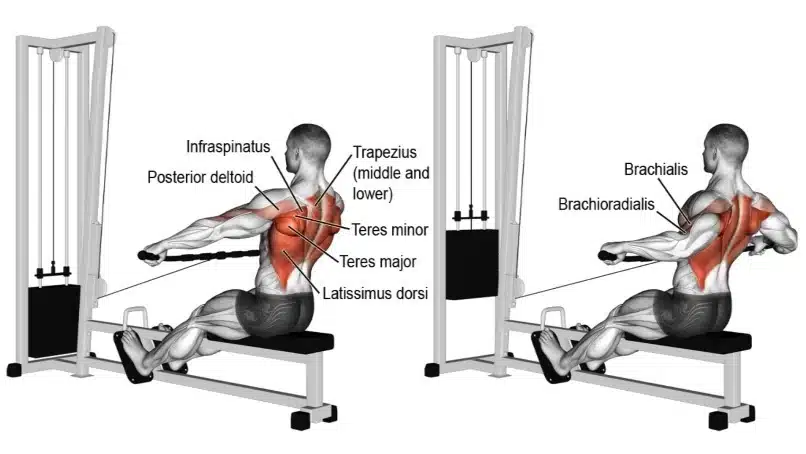
How To Do Wide Grip Seated Low Row
- Sit on a seated cable pulley rowing machine with legs slightly bent and feet supported against the crossbar.
- It’s best to slightly bend your knees because locking them is stressful on the joints.
- Hold the bar with your arms slightly wider than shoulder-width apart.
- Pull the bar so that they come as close to the lower chest.
- Thrust your chest out while pulling with your body in an upright position.
- Slowly return the handle to the starting position.
Know More: Best Cable Shoulder Workout & Exercises for 3D Deltoids
4. Standing Low Cable Rope Row
The standing low cable rope row allows for a greater range of motion than the standard low cable row.
The rope attachment allows you to pull the cable towards your waist at a slightly different angle, which can help to engage the upper back and shoulders more effectively.
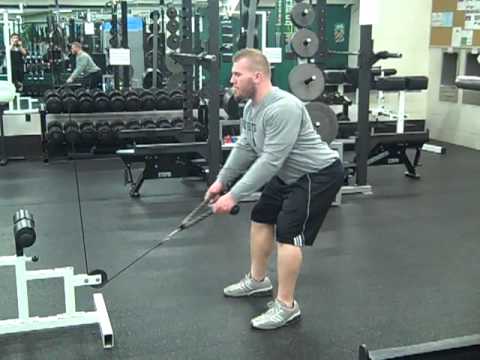
How To Do Low Cable Row With Rope
- Set a cable machine with a low pulley attachment. Attach a rope handle to the pulley.
- Stand facing the machine with your feet shoulder-width apart.
- Grab the rope handle with an overhand grip, with your palms facing each other.
- Bend slightly at the knees and waist to help stabilize yourself.
- Pull the rope towards your waist, and squeeze your shoulder blades together.
- At the end of the movement, pause for a moment, then let go of the tension and let the rope return to the starting position.
Best Alternatives Of Low Cable Row
You can try these alternatives if you’re looking for a similar exercise to replace the cable low row during your training sessions.

Manish is a NASM-certified fitness and nutrition coach with over 10 years of experience in weight lifting and fat loss fitness coaching. He specializes in gym-based training and has a lot of knowledge about exercise, lifting technique, biomechanics, and more.
Through “Fit Life Regime,” he generously shares the insights he’s gained over a decade in the field. His goal is to equip others with the knowledge to start their own fitness journey.
